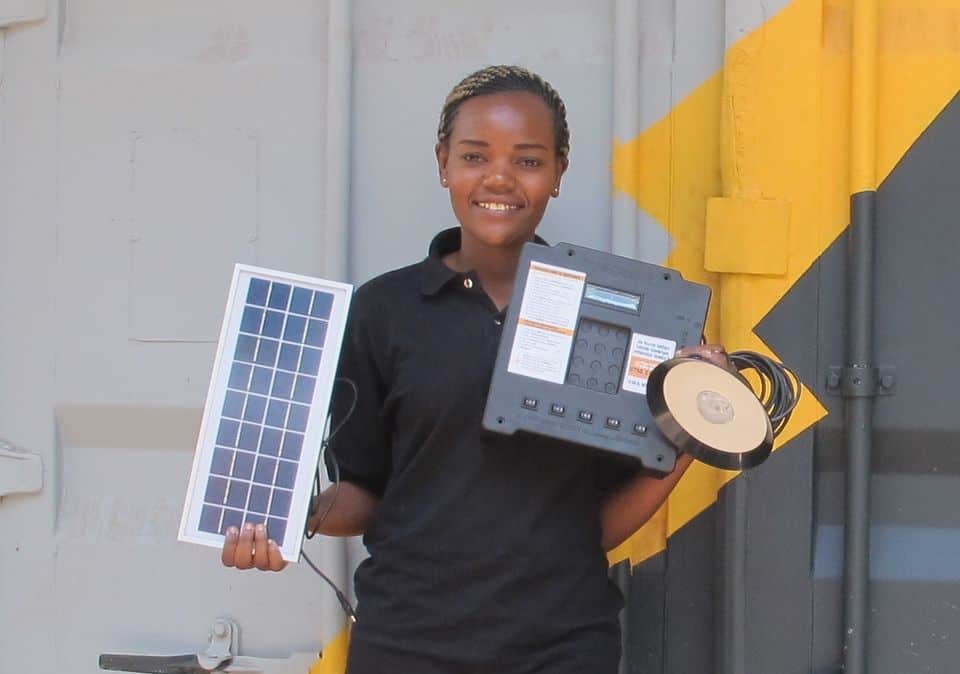By Harriet Lamb, Ashden CEO
Around the world, families are seizing the power of clean, sustainable energy. Solar products such as lights and phone chargers mean that even
families with little money can enjoy the benefits of electricity – from internet access to greater income-earning opportunities.
These breakthroughs can make us feel that a world of limitless energy for everyone is just around the corner. A revolution that will solve all social problems, from education to women’s ‘double burden’ – pressure to look after the home while also earning money.
But we cannot hide from an obvious truth – new technology will not transform communities on its own. To unlock its potential, we must confront bigger questions of justice and inequality. And we must be honest about the impact of energy coming to villages for the first time.
Our new research on energy access in rural Tanzania, conducted over two years, underlines this. Hundreds of women recently connected to clean energy told us their earning power had been boosted, and that they could now work, study and relax later in the evening.
But we also found the full benefits are not reaching everyone, and that the arrival of new energy technology in a home risks shifting power from women to men. The companies that sell solar home systems often benefit from government and NGO funding so they have a responsibility to make sure they are not ignoring, let alone worsening, gender divides.
Download Gender Dynamics and Solar Electricity: Lessons from Tanzania
In the communities we visited, buying or gathering polluting fuels such charcoal and firewood is usually done by women, and any payment for these fuels are made with their cash. But buying and running solar energy systems is often seen a man’s responsibility. Sellers are also more likely to train male customers in how to fix their system if it breaks down.
Household decision-making around buying such systems is highly complicated, with women contributing in a range of ways. But, most of the time, even after discussion, men have the final say on buying a system. Bank and other payment accounts are almost always in the man’s name – even if both partners are equally responsible for finding money to pay the bills.
Existing inequalities are one reason for this. that in the poorest region we visited, only 60% of women owned a mobile phone, and just 4% had a bank account – compared to 90% and 34% for men. We cannot expect clean energy to benefit everyone unless women and men have a strong voice in how it is bought and used.

The women we met were positive about being able to watch television, charge a phone (if they owned one) or enjoy light at night. But the significant labour-saving benefits mainly reached wealthier women – those who could afford to power energy-hungry appliances, rather than just a few lightbulbs.
While access to energy is often touted as creating earning opportunities to earn, many interviewees said concerns about price and reliability had stopped them opening or expanding a business. We must tackle this major roadblock holding back women – and men – from improving their lives through renewable energy.
So, what could businesses do? First, they must make sure they truly understand the needs of women customers. All of the sales agents our interviewees had met were men. While every woman’s experience is different, including women on sales teams might help companies truly serve all of their customers.
Companies often sell their products at the market, a place where men are most likely to be passing by. Enterprises could actively sell to men and women by visiting people in their homes, where they would get the chance to understand the family’s needs. Companies have a strong incentive to do this – we know that when men buy a new system without talking to their partner, there is a higher chance the family will default on payments.
Energy companies could also consider teaming up with enterprises offering sustainable products such as non-polluting cookstoves, that would impact positively on women’s lives.
Critically, experts and energy companies should stop over-claiming for the benefits access to energy can bring. We must acknowledge how the wider problems of poverty and sexism still hold women back. But these problems cannot excuse the lack of progress. Rather, we should confront them with action from energy enterprises, governments, NGOs, the wider business community and others too.
Our research shows just how complex an issue this is. Achieving real change is never as simple as flicking a switch.
- Ashden conducted 607 interviews in the Kagera and Morogoro regions of Tanzania from March 2017 to July 2019. Download the full report here. This article first appeared in The Nation and The Daily Standard.
